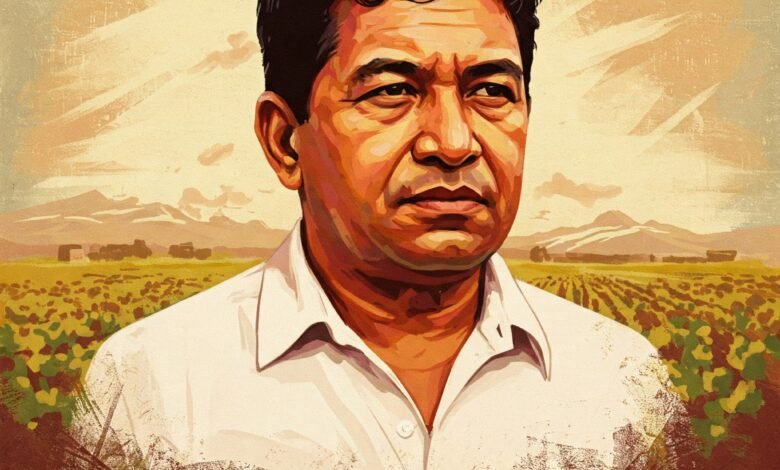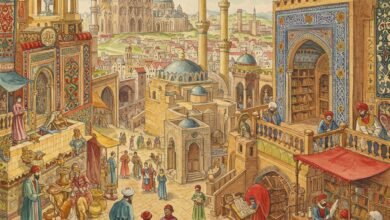The Legacy of Cesar Chavez: Championing Worker Rights and Social Justice

Introduction to Cesar Chavez
Cesar Chavez, born on March 31, 1927, in Yuma, Arizona, emerged as a pivotal figure in the American labor movement and a passionate advocate for social justice. His early life was profoundly shaped by his family’s immigrant roots; his parents, originally from Mexico, faced challenges typical of migrant families, including poverty and discrimination. These formative experiences instilled in Chavez a deep understanding of the socioeconomic struggles of farmworkers and other marginalized groups in society.
Chavez’s commitment to activism was cultivated in an environment where economic inequality was rampant. Growing up during the Great Depression, he witnessed firsthand the plight of laborers who toiled under harsh conditions for minimal pay. The socio-economic conditions of the time highlighted the need for systemic reform, which became a central theme in Chavez’s life and work. After his family lost their farm, they became migrant laborers, and this experience solidified his resolve to fight for workers’ rights and better living conditions for agricultural laborers.
In the 1960s, Chavez co-founded the United Farm Workers (UFW), an organization dedicated to improving the labor rights of farmworkers primarily in California. His leadership was characterized by innovative methods of nonviolent protest, including strikes and boycotts, which gained national attention and support. Chavez’s activism was not solely limited to labor rights; he also promoted broader issues of social justice, health care access, and education for the Hispanic community. Through organizing collective action and fostering a sense of unity among workers, he laid the foundation for a lasting legacy that continues to inspire movements for workers’ rights today. Cesar Chavez’s relentless pursuit of dignity and equality for all remains a compelling narrative in the quest for social justice in America.
The Formation of the United Farm Workers
The United Farm Workers (UFW) emerged in the 1960s as a pivotal organization in the fight for labor rights among agricultural workers in the United States. Founded through the tireless efforts of Cesar Chavez and his associates, the UFW represented a significant advance in the pursuit of equitable labor conditions in farming. Prior to the UFW’s creation, many farm workers faced grueling work hours, inadequate wages, and poor working conditions, often without any formal representation to advocate for their rights.
The seeds of the UFW were sown in 1962 when Chavez joined forces with Dolores Huerta and others, aiming to challenge the status quo in the agricultural industry. Their early organizing efforts were marked by community outreach and the establishment of a cooperative framework among farm workers who shared similar experiences of injustice. Key events in this journey included the 1965 Delano grape strike, where Chavez mobilized thousands of workers, calling for a boycott of table grapes. This strike garnered national attention and highlighted the plight of agricultural laborers, demonstrating the potential of collective action.
The success of the grape boycott ultimately led to the formal establishment of the UFW in 1966, marking a crucial milestone in labor history. Under Chavez’s guidance, the UFW sought to negotiate contracts that would ensure better wages, healthcare, and working conditions for farm workers. His commitment to nonviolent protest and the use of tactics such as marches and boycotts rallied public support, bringing widespread awareness to the challenges faced by agricultural laborers. Additionally, the UFW’s formation inspired similar movements across the country, leading to greater recognition of worker rights in various industries.
Key Strikes and Campaigns
Cesar Chavez’s leadership was marked by several pivotal strikes and campaigns that not only advanced the cause of farmworkers but also galvanized broader movements for social justice. Among the most notable was the Delano Grape Strike, which began in 1965. This historic action was initiated by a group of Filipino farmworkers who sought better wages and working conditions. Chavez, recognizing the significance of this struggle, quickly organized the United Farm Workers (UFW) to lead the campaign, uniting labor forces and harnessing the public’s support.
The Delano Grape Strike lasted for five years and was characterized by tactics such as picketing and nonviolent protests, demonstrating Chavez’s unwavering commitment to peaceful advocacy. A crucial strategy involved mobilizing community support through the establishment of alliances with civil rights groups and youth organizations. These alliances not only amplified the voices of the farmworkers but also brought national attention to the injustices faced in the agricultural sector. By leveraging these relationships, the UFW was able to sustain the momentum of the strike, which ultimately led to a nationwide boycott of table grapes, further pressuring growers to negotiate.
The boycott proved to be an effective strategy, attracting millions of supporters across the United States. Consumers were encouraged to abstain from purchasing grapes, which significantly impacted the grape industry’s profits and provided the UFW with leverage in negotiations. This wave of solidarity transcended racial and economic lines, uniting diverse communities in support of farmworker rights. The successful conclusion of the Delano Grape Strike, which resulted in improved labor contracts, marked a turning point in labor relations and set a precedent for future campaigns.
Chavez’s role in these key strikes not only elevated the discourse surrounding agricultural labor practices but also inspired subsequent generations of activists to continue the fight for social justice and workers’ rights.
Chavez’s Nonviolent Philosophy
Cesar Chavez’s commitment to nonviolent resistance was a cornerstone of his activism and a defining characteristic of his legacy. Grounded in the philosophies of influential figures such as Mahatma Gandhi and Martin Luther King Jr., Chavez advocated for peaceful strategies to address the injustices faced by farmworkers. His belief in the power of nonviolence stemmed from a deep conviction that change could be achieved without resorting to violence and confrontations that could lead to further animosity.
One of the most notable methods employed by Chavez was the hunger strike, a powerful form of protest that drew attention to the plight of agricultural workers and the broader social injustices they experienced. Through his hunger strikes, Chavez not only illustrated his commitment to the cause but also inspired solidarity among farmworkers and supporters alike. His determination to fast for extended periods highlighted the sacrifices he was willing to make, effectively galvanizing public opinion around labor rights and social justice.
In addition to hunger strikes, Chavez organized peaceful protests and marches intended to raise awareness about the working conditions of farm laborers. The most famous of these was the 1966 march from Delano to Sacramento, demonstrating an unwavering commitment to worker rights while employing nonviolent tactics. This pivotal event drew national attention to the struggles faced by agricultural laborers and solidified Chavez’s reputation as a prominent activist. His approach to nonviolence not only emphasized the need for dignity and respect but also served as a reminder that social change can be pursued through constructive dialogue and peaceful means.
Ultimately, Chavez’s nonviolent philosophy reinforced the belief that sustained advocacy rooted in respect and understanding could effect meaningful change. His legacy continues to inspire future generations of activists who recognize the significance of compassion in the pursuit of justice.
Meeting with Political Figures and Allies
Cesar Chavez, the eminent labor leader and civil rights activist, forged significant relationships with numerous political figures throughout his career, which in turn influenced labor policies in profound ways. His steadfast commitment to improving the welfare of farmworkers necessitated interaction with politicians at various levels, including U.S. presidents. Perhaps one of the most notable meetings occurred with President John F. Kennedy in 1963, wherein Chavez discussed the dire conditions faced by agricultural laborers. This interaction not only raised awareness about the plight of farmworkers but also helped lay the groundwork for future reforms in labor policies under the Kennedy administration.
Chavez’s political maneuvering extended beyond the White House. He engaged with a range of senators and congressmen who advocated for worker rights, enabling him to amplify his message and garner support for the United Farm Workers (UFW). The cooperative efforts resulted in the passage of significant legislation aimed at enhancing protections for laborers, including occupational safety and minimum wage laws. Chavez’s approach was not limited to negotiations with lawmakers; he sought alliances with various social movements as well. His unwavering commitment to social justice resonated with organizations advocating for civil rights, environmental protections, and community empowerment, thereby forming a powerful coalition advocating for systemic change.
Moreover, Chavez’s relationships with other influential figures, such as Martin Luther King Jr. and Dolores Huerta, showcased the unity among marginalized groups. These alliances were pivotal not only in terms of solidarity but also in inspiring a generation of activists who believed in the dual fight against economic inequity and social injustice. The collective efforts of Chavez and his allies created a legacy that not only transformed labor rights but also reinforced the essential connection between various movements for equality. The ramifications of these interactions continue to influence contemporary discussions around labor rights, demonstrating the lasting impact of Chavez’s endeavors in the political sphere.
Challenges and Opposition
Cesar Chavez’s journey as a champion of worker rights and social justice was fraught with significant challenges and opposition. One of the most formidable obstacles came from agribusiness interests, who fiercely resisted his efforts to organize farmworkers for better wages and working conditions. Large agricultural companies viewed Chavez’s United Farm Workers (UFW) as a direct threat to their profits, leading to aggressive tactics aimed at dismantling the union’s influence. This included mass layoffs, intimidation of workers, and even violent confrontations with UFW members. The agribusiness lobby wielded considerable power, which made the struggle for labor rights exceptionally fraught.
Furthermore, Chavez faced accusations of extremism, both from his opponents and within parts of the broader civil rights movement. Critics often portrayed him as a radical figure, suggesting that his demands for social justice went too far and that his methods of nonviolent protest and boycotts were overly confrontational. These perceptions not only hindered collaboration with other movements but also alienated potential allies who perceived a risk in associating with Chavez. Despite the negative press and frequent misrepresentation of his actions, Chavez maintained a steadfast commitment to nonviolent methods as a means of achieving justice.
Additionally, internal conflicts within the labor movement posed another significant challenge. There were ideological divides regarding the direction of labor organizing, disagreements over tactics, and disputes over leadership within the UFW and allies. These tensions sometimes complicated Chavez’s ability to unify a fractured labor base, leading to challenges in mobilizing mass support for the cause. Yet, through resilience and strategic negotiation, Chavez effectively navigated these hurdles and was ultimately able to sustain the momentum of the labor movement, securing vital gains for farmworkers and setting a precedent for future civil rights activism.
Chavez’s Impact on the Labor Movement
Cesar Chavez significantly influenced the labor movement in the United States, particularly in the realm of farm workers’ rights. His activism catalyzed a shift in how labor struggles were perceived and addressed, highlighting the unique challenges faced by agricultural laborers. Chavez’s leadership in the United Farm Workers (UFW) brought considerable attention to the plight of farm workers, many of whom were marginalized and lacked essential protections. His approach combined grassroots organizing with a steadfast commitment to non-violence, effectively mobilizing both workers and consumers to support labor rights.
The impact of Chavez’s work can be observed in the transformations that occurred in labor laws following his organizing efforts. In the 1970s, as a result of increased awareness and advocacy, various legal protections were introduced that specifically addressed the needs of agricultural laborers. These included regulations concerning working conditions, wage rights, and access to benefits that were previously denied to this group. Chavez’s relentless campaigns, such as the Delano grape strike, underscored the urgency for change and brought about landmark agreements recognizing workers’ contributions and rights.
Moreover, Chavez’s legacy extends beyond legal reforms; his activism fostered a greater recognition of the dignity and importance of farm workers in the broader labor landscape. By elevating the voices of marginalized agricultural workers, he helped to create solidarity movements that transcended sectors. This sense of unity among workers from diverse backgrounds has continued to inspire labor efforts, promoting inclusivity and equitable treatment within the workforce. Ultimately, the long-term effects of Chavez’s legacy are evident in the ongoing fight for worker rights, as many still look to his principles and strategies in their pursuit of social justice and equality in labor.
Commemoration and Legacy
The legacy of Cesar Chavez remains a vital part of contemporary discussions around worker rights and social justice. Known for his unwavering commitment to labor rights and his strategic approach to nonviolent activism, Chavez’s influence continues to resonate across various sectors. His enduring legacy is commemorated through national holidays, educational initiatives, and ongoing social movements recognized worldwide.
One significant observation of Chavez’s contributions is the establishment of Cesar Chavez Day, celebrated on March 31st in several U.S. states. This day honors his life and achievements, serving as a reminder of the importance of advocacy for fair labor practices. Schools, community organizations, and governments engage in activities that promote Chavez’s teachings and principles. This rejuvenation of his ideals aims to inspire new generations in the pursuit of justice for workers, reinforcing the values of empathy and solidarity.
Additionally, educational initiatives that focus on Chavez’s methodologies have proliferated. Various curricula in schools and universities highlight his tactics for organizing farm workers and his emphasis on grassroots movements. These educational programs also link his work to broader themes of civil rights and social justice, providing students with a comprehensive understanding of the struggle against inequality. As society grapples with persistent issues of worker exploitation and discrimination, Chavez’s strategies, such as grassroots mobilization and coalition building, are seen as relevant and effective approaches in contemporary activism.
Chavez’s legacy is further perpetuated by labor organizations and civil rights groups that actively champion the rights of marginalized workers. These organizations often invoke Chavez’s spirit to galvanize support for various causes, including immigration reform, living wages, and equitable labor standards. The ongoing fight for worker rights is thus steeped in the principles established by Chavez, ensuring that his legacy continues to inspire action and progress in the name of social justice.
Conclusion: The Continuing Relevance of Cesar Chavez
Cesar Chavez’s legacy as a champion of worker rights and social justice remains profoundly relevant in today’s societal context. His unwavering commitment to the cause of migrant farm workers and labor rights has inspired countless individuals and movements advocating for equitable treatment of all workers. The principles Chavez espoused — dignity, respect, and justice — resonate today as communities around the world confront ongoing issues of inequality and exploitation.
Current social justice movements reflect many of the ideals that Chavez championed throughout his life. Issues such as fair labor practices, comprehensive immigration reform, and racial equality underline the continuing struggle for human rights that Chavez dedicated himself to. Modern activists can draw invaluable lessons from his nonviolent approach to protest and collective bargaining. The importance of organizing and mobilizing communities, as demonstrated by Chavez, underscores the necessity of solidarity in effecting meaningful change.
Furthermore, the language of social justice has evolved, but the core tenets remain steadfast, echoing Chavez’s vision. The discussions surrounding food justice, environmental justice, and workers’ rights illustrate how interconnected these issues are, mirroring the complexity that Chavez recognized in the landscape of social equity. His initiatives to empower farm workers through education and unionization serve as a blueprint for future advocacy efforts.
In contemplating how to apply these enduring principles within our own communities, individuals are called to examine the ongoing challenges faced by marginalized groups. By embracing Chavez’s ethos of compassion, resilience, and activism, modern citizens can contribute to a legacy that not only honors his memory but also paves the way for a fairer future. The call to action remains clear: remain vigilant and engaged in the pursuit of justice, just as Chavez did, fostering an inclusive environment that uplifts all voices.






















